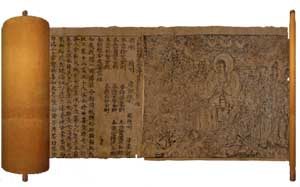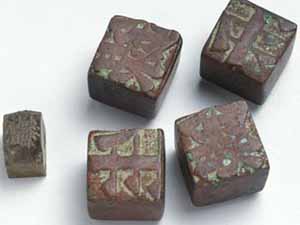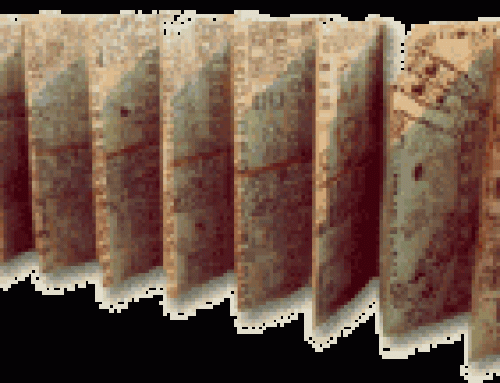
Early Chinese literature: an oracle bone with Chinese characters written on it
When did people start to write in China?
People in China started to write about 1500 BC, more than a thousand years later than people in West Asia or Egypt, but earlier than anyone in Europe or Central America. It’s possible they learned about writing from the same Yamnaya herders who brought horses and chariots to China during the Shang Dynasty.
Who were the Yamnaya?
Cuneiform in West Asia
The Shang Dynasty
All our China articles
Oracle bones
The earliest writing that we know of from China was on animal bones, which are called “oracle bones” because priests used them to tell the future. The writing on these oracle bones is the same writing that people use in modern China, just in an earlier version.
Early Chinese religion
Egyptian hieroglyphs
History of the alphabet
The signs they used started out as pictures, like earlier Egyptian hieroglyphs or Sumerian cuneiform. People in the Levant had already invented the alphabet , but maybe the Yamnaya didn’t know about it yet.
What did people in China write on?

Chinese scroll made by kids at Laurelhurst School, Portland Oregon
People in early China also wrote on strips of bamboo wood. Later on, people also wrote on silk cloth. The earliest Chinese literature that we know of probably comes from the later part of the Western Zhou Dynasty about 800 BC (the same time as Homer in Greece) and was written on silk. This is the I Ching, a fortune-telling book, like the earlier oracle bones. In the 500s BC, the two philosophers Lao Tzu and Confucius wrote down their ideas about how people should act.
The I Ching
Lao Tzu and Taoism
Who was Confucius?
Where does silk come from?
Western Zhou Dynasty
Sun Tzu’s Art of War
Sometime around 300 BC, in the Warring States period, a general called Sun Tzu wrote a book called the Art of War, about the best ways to organize armies and battles.
The Art of War
Warring States China
The Song of Everlasting Sorrow, in Chinese
The invention of paper
Around 100 BC, Ts’ai Lun invented paper to write on. Paper was cheaper to write on than silk, so more people wrote and copied books during the Han Dynasty. The first woman writer of China that we know about, Ban Zhao, lived later in the Han Dynasty, in the first century AD.
The invention of paper
She wrote many books, including poetry and a history of the Western Han. Ban Zhao also wrote astronomy and math books, and she wrote “Lessons for Women,” which advised women to submit to the men around them. This last book became very famous.

Wong Jei’s block-printed scroll, 868 AD
Wood-block printing
During the Tang Dynasty, about 700 AD, people in China invented wood-block printing, which was easier than copying out books by hand and made books much cheaper than they had been before.
History of printing
Who was Bai Juyi?
The Song of Everlasting Sorrow
The poetry of Xue Tao
Many more people learned to read, and many more people wrote books. The poet Bai Juyi wrote a famous poem, the Song of Everlasting Sorrow. Soon afterwards, Xue Tao wrote poems about her life as a Chinese woman.
Movable clay type

Chinese moveable type
During the Song Dynasty, about 1000 AD, people invented movable clay type, and this made books even cheaper and more popular than before. In 1103 AD, Lie Jie published a book setting architectural standards for all of China.
Romance of the Three Kingdoms
One of the most famous novels of early China is the Romance of the Three Kingdoms, which was written about 1330 AD, during the Yuan Dynasty, by a man named Luo Guanzhong. Two more famous novels, Journey to the West and Fengshen Yanyi, were written in the 1500s, during the Ming Dynasty.
Romance of the Three Kingdoms
Monkey: Journey to the West
Fengshen Yanyi
Did you find out what you wanted to know about early Chinese literature? Let us know in the comments!
A project making a Chinese scroll
Bibliography and further reading about Chinese language and literature:
Eyewitness: Ancient China, by Arthur Cotterell, Alan Hills, and Geoff Brightling (2000). , with lots of excellent pictures.
Daily Life in China, on the Eve of the Mongol Invasion, 1250-1276, by Jacques Gernet (1962).
The Inner Quarters: Marriage and the Lives of Chinese Women in the SungPeriod, by Patricia Buckley Ebrey (1993).
Women of the Tang Dynasty, by May Holdsworth (1999). A short introduction, with many pictures of T’ang period figurines.




